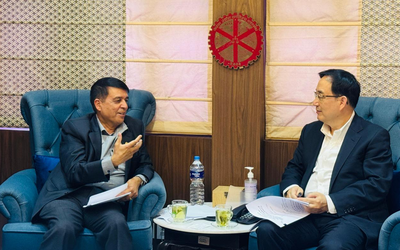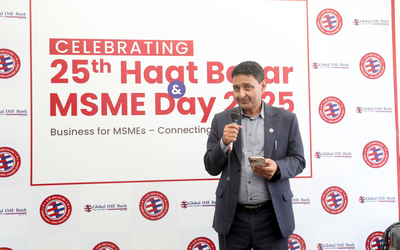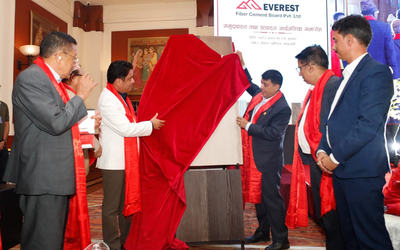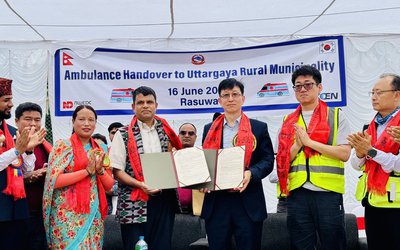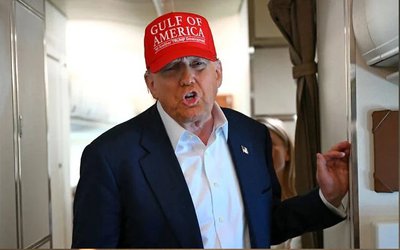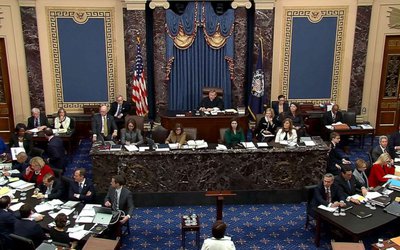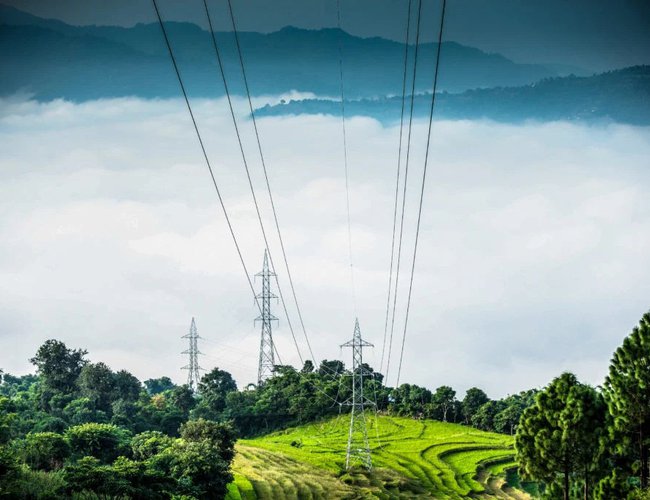
It has been made public that the Chairman of the main opposition party CPN-UML has proposed to the Prime Minister to remove the Speaker, open the door to the House of Representatives and help approve the US assistance project, Millennium Challenge Corporation(MCC). Prime Minister Deuba, who is also the president of the Nepali Congress, had recently visited Oli's residence to meet him.
During the meeting, it was made public that Prime Minister Deuba had asked for help to open the parliament and approve the MCC. Prime Minister Deuba recently told some top leaders of the coalition and party leaders close to him that Oli's removal of the speaker would open the door to parliament and help pass the MCC.
Prime Minister Deuba has been in favor of getting the MCC approved by Parliament from the beginning. But the ruling coalition has not been able to reach a consensus. In particular, the leaders of the CPN-Maoist Center and the Unified Socialists do not seem ready to get approval from the MCC Parliament in the status quo.
Another Communist Party will be in power, and the NC will not be able to help pass the MCC. It is not so easy to remove the Speaker from his seat . Article 91 of the Constitution provides for the Speaker and Deputy Speaker. Article 91 (6) According to the Speaker and Deputy Speaker, if there is no member of the House of Representatives, if the Speaker resigns in writing and if the motion that the Speaker has not acted in accordance with the post is passed by a two-thirds majority of the total remaining members of the House of Representatives . Rule 207 of the Rules of Procedure of the House of Representatives 2075 provides for the process of advancing the motion that the Speaker or the Deputy Speaker has not behaved in a manner befitting the post. Rule 209 states that if the proposal as per… 207 is passed by a two-thirds majority of the total number of members present in the House, the Speaker or Deputy Speaker concerned shall be relieved of office. But without the support of the Maoist Center, the Unified Socialists and the JanataSamajwadi Party, the two-thirds majority in the House of Representatives will not be reached.
Also, the Congress is not in favor of removing the speaker and creating animosity with anyone. "There are those who believe that the UML will support the MCC as soon as it is ready to break the alliance rather than irritate anyone by removing the speaker.
The Nepali Congress cannot go for such a bad option." Prime Minister Deuba is also under pressure to get approval from the MCC parliament within this February.
As such, we must now demonstrate Nepal's diplomatic ability to persuade the United States to reconsider some of the controversial provisions of the MCC and then pass an agreement in the Federal Parliament, which will be a victory not only for Nepal and the United States but also for the world. There has been a lot of confusion and misunderstanding about the MCC-funded project in Nepal and it has created a big political divide. Opponents of the MCC Nepal Corporation see it as part of an "Indo-Pacific strategy" to curb China's economic and strategic influence.
Proponents of the case have been working to make the actual transcript of this statement available online. MCC Nepal is the largest grant agreement ever signed. Nepal was selected as eligible to develop a compact program with MCC.
After completing 16 of the 20 policy indicators, Nepal became the first country in South Asia to be selected for the MCC. This is the first grant agreement that needs parliamentary approval. However, it has already been registered in the Federal Parliament for approval.
The Nepali Parliament has yet to approve the MCC ,Nepal Compact. As a result, the United States has said further delays could force the return of aid to some other countries. Therefore, the political and diplomatic crisis in Nepal is growing.
It is to be noted that the most controversial issue of MCC Nepal is whether MCC Nepal is included in the Indo-Pacific strategy proposed by Compact America. Does it affect Nepal's security or not? Does Nepal audit the project or is it done by USA? And is that agreement above the constitution of Nepal or not? Due to these controversial issues, Nepali intellectuals, political leaders and academics have stood against the MCC project.
Some of them argue that many of the provisions of the MCC could jeopardize Nepal's sovereignty in the long run. As Nepal is the chair country of SAARC and a member of BIMSTEC, the United States believes that Nepal can play an important role in the Indo-Pacific region.
The United States, through a number of US officials in Nepal, has been urging Nepal to play a leading role in an independent and open Indo-Pacific. In addition, the United States' Indo-Pacific Strategy Report of June 1, 2019, explicitly states that China is a revisionist power and threat, while Nepal maintains friendly relations with China. Four months after the signing of the BRI, Nepal signed an agreement on September 14, 2017 on the MCC project in the United States to build a 400 kV high voltage transmission line and upgrade the road.
Strategic and economic competition is going on between the US and China. We have seen trade wars and growing geopolitical, security rivals in various fields that help Nepali intellectuals and political leaders to doubt that the MCC is just an economic project or that it has geopolitical interests.
To have a relationship with someone other than someone is against Nepal's guiding principle of "friendship with all and non-enmity with anyone" and could jeopardize Nepal's neutrality.
Nepal's relations with the United States have been going on since time immemorial and since the establishment of diplomatic relations on April 25, 1947, Nepal's economic relations have been strengthened. The exchange of high-level visits has also made a significant contribution to improving Nepal-US relations.
The United States has always supported Nepal's socio-economic development. The Commerce and Friendship Agreement of 1947 and the General Agreement of Technical Assistance in 1951 have contributed to the strengthening of bilateral relations between our two friendly nations.
The United States has signed a bilateral trade agreement with Nepal, promising to significantly increase Nepal's exports. Nepal has always considered the US market as an important market for Nepali products. Many handicrafts, paper products, jewelry, gems, stones are exported to America. For the past decade, the United States has been a major importer of our readymade garments, an industry that has a history of helping reduce poverty and create higher employment rates.
Apart from hydropower, there is great potential for tourism in Nepal. The best market that Nepal can provide in the international arena is tourism. Therefore, the development of tourism sector can bring a big change in the livelihood and economic situation of Nepal. Nepali entrepreneurs are of the opinion that the US imports Nepali products especially readymade garments, handicrafts, pashmina and other NTFP products as the US is really interested in Nepal's development. In the context of joint venture projects, Nepal is also requesting the United States to attract large projects that can change the living standards of Nepalis.
In order to promote and enhance bilateral relations, it is necessary to increase the number of trade delegations from the United States and Nepal, and to provide opportunities for participation in trade fairs / exhibitions in both countries. At a time when the Nepalese government and the private sector are trying to diversify their production in the international market, the provision of about 500 items, which are the priority of the US normalized system, could bring about a major change in Nepal-US trade.
Nepal currently exports about 200 items to international markets, including the United States, with or without customs-free and quota-free provisions. Measuring this share of exports from the modern trend of trade, Nepal still has a lot of homework to do to promote its products.
It is unfortunate that the government of our country or the private sector has not fully recognized the subject matter of the general acceptance system facility for the use of goods of comparative and competitive advantage like international and regional business bodies. Looking at the general details, it seems that most Nepali products fall under GSP facilitation. The United States has helped us diversify our products. If readymade garments and woolen carpets are provided under the general acceptance system scheme, it will be really useful for poverty alleviation and job creation. The country is making every effort to increase exports and reduce trade deficit. At present, Nepal Trade Integration Strategy 2016 is being implemented to increase trade competition. Major Exports: Iron and Steel Products, Woolen Carpets, Yarn, Textiles, Readymade Garments / Sal, Juice, Herbs, Tea, Cardamom, Leather and Leather, Shoes, Handicrafts Major Import Petroleum Products, Iron and Steel, Machinery & Parts, Electronics & Electrical Equipment, medicine, fertilizer are the priority export potential areas The United States is an important trading partner of Nepal. It is also a major source of foreign exchange for Nepal, mainly from the export of textiles and carpets as well as from tourist income. Exports of Nepali readymade garments to the United States have declined significantly since the end of the quota system under the Multi-Fiber Agreement (MFA) in 2004. The United States is currently the third largest trading partner in terms of total trade and the second largest export destination for Nepal. Despite the small volume of bilateral trade, Nepal's trade deficit is widening. The Government of Nepal is encouraging entrepreneurs to increase exports to the United States. Nepal and the United States signed the Trade and Investment Framework Agreement (TIFA) on April 15, 2011. Nepal signed the Trade and Investment Framework Agreement (TIFA) with the United States in April 2011. The United States stands ready to deepen its relationship with Nepal and break down any and all barriers that could hinder Nepali producers and exporters.
TIFA meets regularly at least once a year on bilateral trade and investment issues, with a permanent body acting as a forum for bilateral talks to promote trade and investment and discuss specific trade issues. The agreement promises to give priority to Nepali products and facilitate entry, but signing the agreement alone will not help increase exports to the United States.
We need to develop products that are competitive in the US market to achieve the expected growth in trade. Garment traders in Nepal were optimistic after the US Congress enacted the Trade Facilitation and Trade Enforcement Act a few years ago. However, the law does not cover major textile products produced in the country. GPZ installation in Simara can move forward.
Lack of proper initiatives in economic diplomacy in the past is considered to be the main reason for the nation's sluggish hold in the US market, which is considered to be the largest buyer of Nepali readymade garments in the US market.
Compared to the export of nearly two decades ago, the overall export of Nepali readymade garments has decreased drastically. However, if the government understands that it is a major exportable commodity of the country and provides the necessary facilities and assistance, exports may increase again.
Nepal has always considered the US market as an important market for Nepali products. Many agricultural products, such as handicrafts, paper products, jewelry, gems, stones and tea, coffee, are exported to the United States. For the past fifteen years, the United States has been a major importer of our readymade garments, an industry that has helped reduce poverty and create higher employment. Achieving the national goal of moving Nepal from a least developed country to a group of developing countries by 2022 also requires US assistance and assistance.
It is necessary to further strengthen the diplomatic, economic, trade, educational and social ties between the United States and Nepal. Industry, chambers of commerce, students, academia, sports and humanitarian activities have been contributing significantly to the strengthening of diplomatic relations between the two countries. The public sector and the private sector complement each other. The contribution of the private sector to the annual investment in the economy for economic development is about 70 percent. Therefore, Nepal has accepted the private sector as the engine of economic development.
Considering this situation, it seems necessary for the private sector chambers of commerce to make their role more effective.
As soon as the new president arrives in the United States, his policy will affect Nepal and Nepalis in some ways. But in policy, the former ambassadors argue that it is not much different.
- Susan's “U-Turn” From Atheism To Spirituality And Superstition: Some Considerations
- Jun 29, 2025
- Former Ambassador To People’s Republic Of China Acharya's 'Diplomatic Diary': A Collection Of "Autobiography " Including Diplomacy
- Jun 17, 2025
- Banker And Businessman Being The Same Person: How Practical, How Impractical
- Jun 01, 2025
- 2082/83 Policy And Program: Presentation New, Short But Not Exciting
- May 07, 2025
- Nepal's Capital Market: Some Analysis
- May 02, 2025



